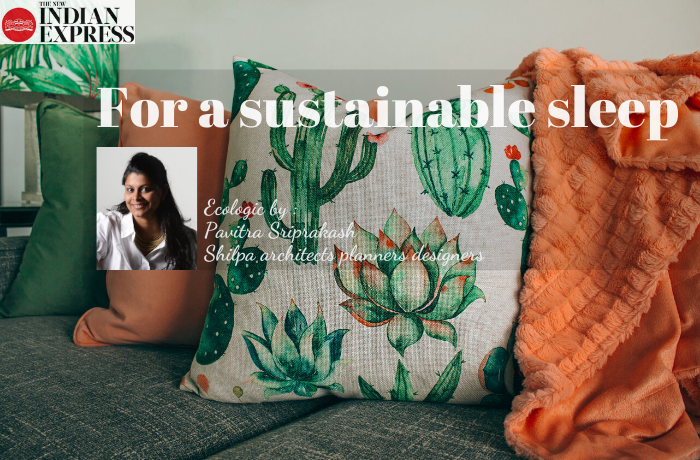05-Mar-2020: Pavitra Sriprakash, Director and Chief Designer at Shilpa Architects Planners Designers writes a weekly column on Sustainability for The New Indian Express titled “ECOLOGIC”. This week she writes about a sustainable nights sleep !
Full article below: (Also available at The New Indian Express Website)
For a sustainable sleep
The question of the day is how sustainable are you while you sleep? Most of us do not replace our pillows, mattresses, duvets and other bedding items often, thereby making this a pretty sustainable activity. But we still have to choose well when it comes to buying a new pillow. Let’s face it, when it comes to pillows, especially the longer it has been with you, the more ‘ergonomically’ and ‘emotionally’ attached you are to it. For example, the goose down pillow that I bought almost 10 years ago is my trusted bedside companion and I cannot imagine a good night’s sleep without it.
Down is a renewable resource that is biodegradable and recyclable thereby making it a ‘sustainable’ choice per se. Unfortunately, down does not start off kindly. With my growing consciousness against the cruelty of animals, I realise that down feathers are collected rather inhumanely; and this is not something I can consciously choose to live with for the next 10-15 years. Buying a down pillow is not a sustainable choice for me anymore. When shopping for a new replacement I realised that there are so many different types of pillows available today that finding the right one can be downright confusing. Memory foam, micro-bead, even water pillows, exist. With so many choices, what is the Eco-sensitive and ethical choice?
The various types of pillows available today are most easily categorized by what they’re filled with. A good quality fabric pillow case, or shell, is an important component but its general character is dictated by the filling. The pillow’s filling makes it feel the way it does and offers the required cushioning and comfort we seek. The obvious choice for the shell is always cotton, better to stay away from Rayon and other synthetic or blended material. Cotton is soft, breathable and cheap to manufacture. Be aware though, that the production of cotton can sometimes result in toxic chemicals being released into the environment. Always look to purchase certified organic cotton bedding.
When it comes to the fillings, it is quite obvious that a majority of them are synthetic materials which are rubber- or nylon-based material, which will be hard to dispose of. It is best to avoid poly-fill as it is filled with chemicals and is a significant contributor to the pollution of our environment. Memory foam contains polyurethane and can ‘off-gas’ Volatile Organic Compounds (VOCs) during the life of the product if it has been cheaply manufactured. Similarly, micro-bead pillows are also laden with chemicals and are tricky to dispose.
When it comes to natural fillings, you may come across cotton, wool, buckwheat, rice husk and maybe water! The cotton pillow has been around forever, and we have all had them at some point. At this point after tying a lot of different types of pillows, I think nothing beats an all-natural, old-fashioned buckwheat pillow. They have been household fixtures in Japan for centuries. Rice husk pillows or buckwheat pillows have recently re-gained popularity for their ability to support posture and spinal alignment as well as their eco-appeal. So go ahead, make a conscious choice in your bedding and sleep well — Sweet sustainable dreams!



